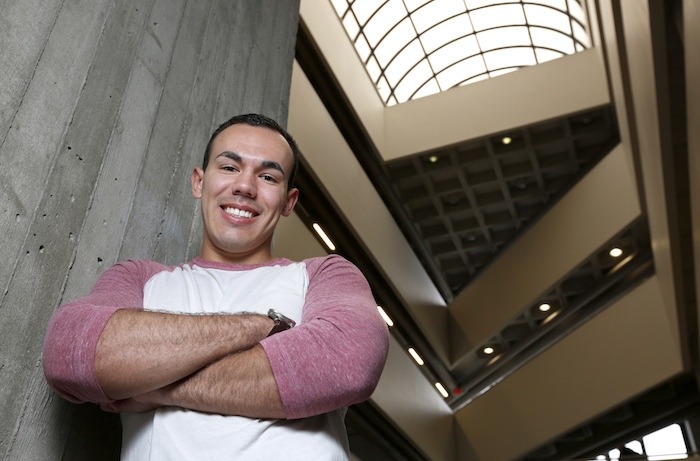
Dakota Sanchez has found his home in community and regional planning. Photo by Christopher Gannon.
AMES, Iowa -- Dakota Sanchez is in his fourth semester at Iowa State University. And he's on his fourth major.
No worries though. The sophomore from Des Moines has found his home in community and regional planning. An extra-credit lecture sealed the deal.
"The Ferguson Moment: Poverty, Politics and Planning in the Suburbs of St. Louis," a lecture presented by University of Missouri-St. Louis professor Todd Swanstrom last October, clicked with Sanchez, said Francis Owusu, professor and chair of ISU's community and regional planning department.
"Dakota came to me and said, 'This is the issue I want to spend my life thinking about,'" said Owusu.
He subsequently arranged for 20 planning students to visit St. Louis and Ferguson to "understand the nature of these problems and the role of planning in what has been happening." Unfortunately, Sanchez could not go.
"The lecture was a catalyst for me," Sanchez said. "I went for extra credit since I had followed events in Ferguson somewhat. I even took notes because it was so interesting. I really got into it."
Swanstrom discussed trends in economical and racial segregation in suburban St. Louis County, and the fragmented and often under-resourced institutions that struggle to address inequity.
"The speaker talked about a whole side of the problem that no one was talking about. I thought, 'This is what I'm interested in -- how social problems in our country relate to planning and neighborhoods,'" Sanchez said.
Finding his way
The first in his family to attend college, Sanchez received a four-year, full-tuition Multicultural Visions Program Scholarship administered through ISU's Office of Multicultural Student Affairs. A minimum grade point average is required to retain the scholarship. By the end of his freshman year, Sanchez was in serious danger of losing the scholarship. Without it, he would have to return home.
"In high school, I never had to study for a test to get an A and I could turn in assignments late. Basically, I breezed by. But college was a reality check. I realized I couldn’t do that here," he said.
Sanchez started at ISU as a psychology major (even though he had never taken a psychology class), switched to open option second semester and took some courses in the design college. He started sophomore year with a major in landscape architecture ... until he realized he couldn't draw.
Last fall, a faculty member spoke to Sanchez's core design class about community and regional planning. Sanchez didn't know what it was.
"I then told Francis I wanted to make a difference and help people in my community. He said, 'It sounds like you want to be in community and regional planning and don't even know it,'" Sanchez said.
He agreed to take a couple of classes to see what planning is about. By the end of his third semester at Iowa State, Sanchez had raised his GPA to 3.77 and was named to the dean's list.
"I fell in love with it and haven't looked back. I've really enjoyed my classes," he said.
Making connections
Owusu also connected Sanchez to a mentor — Aaron Todd, a 2005 alum in Des Moines who "could help Dakota learn how to take his ideas and translate them into policy."
Todd, a research analyst and policy adviser to the Iowa Senate majority, encouraged Sanchez to think about interdisciplinary courses that could complement his planning classes. Todd also suggested social justice and economic development organizations in Des Moines that Sanchez might want to connect with.
"I encouraged him to look at his interest in the Ferguson issues and think through how he could combine what he was learning in the planning curriculum with community socioeconomic topics," said Todd, who will continue mentoring Sanchez.
Planning ahead
"No one likes Des Moines more than me. It's great the way downtown has changed and all that's happening there," Sanchez said. "I want to make it not only an attractive place to visit, but also an attractive place to live.
"My dream job would be to work as a planner in Des Moines. There's so much you can do with planning, including revitalization and social equity. Zoning and transportation don't interest me, but working with people does. Being able to make cities like Des Moines better. I haven't learned how to do that yet, but I will."
"I want to go into neighborhoods and talk to people, see what they want and help them help themselves," Sanchez said.
"And Francis told me that whatever route I want to go, the department supports me and will help me get where I want to be," he said. "If I need help, I know they'll help me. I know they'll be behind me."